Note: Something a little different: an essay I originally wrote in 2009 on postmodernism and how (some) video games have begun to play with the author/reader relationship in a way that’s not possible in any other medium.
Video games and postmodernism go hand in hand. It’s a natural development, as the rise of postmodernism is tied strongly to the rise of technology. These days, most people access postmodern media through television and film. Scrubs, Community, Fight Club, Scott Pilgrim are just a few examples of entertainment that plays with the medium it belongs to. It enables all kinds of new ways to twist and turn the relationship between author and audience, an ability that previously belonged only to the novel. Postmodernism has gone from book, to film, to TV, and in the last three decades, to an even newer medium and arguably the most postmodern: video games. What makes it the most postmodern? With games, the ‘reader’ is literally in control. Not only has the author died, he’s handed you his manuscript with a note saying “go nuts”. Or has he?
In this highly interactive, highly editable, android and tablet-enabled world where people tweet conversations they’re having while they’re still having them, and every intimate detail about your personal life can be obtained by complete strangers, it’s not a stretch to say that our lives are already permeated with postmodern traits. With video games the consumer is not passive as with film and books, but active players who are able to interact with, alter and edit the narrative as it occurs. Games then, should be considered to be at the pinnacle of the postmodern artform.
I can imagine many people who would cringe at the idea of calling video games art and I completely understand. I do not feel that the Call of Duty series, for example, will ever be considered art. Although at the rate they churn them out who knows (see: infinite monkey theorem). Not all games should be considered art but perhaps by the end of this I’ll have persuaded you that some games should be considered art.
Bioshock, developed by Irrational Games and released in 2007 to both critical and commercial success, is as much blockbuster action as it is a self-referential commentary on video games. It deliberately deconstructs the traditional myth of interactivity and choice and suggests that, instead of you playing the game, it has been playing with you. Before I can explore this further, some plot will have to be explained. The game is five years old, but all the same:
!SPOILERS!
Bioshock is set in an alternate 1960 and takes place in a dystopian underwater city called Rapture. Rapture was conceived by former socialist businessman Andrew Ryan, who wanted to create a state to escape the increasingly oppressive political, economic and religious authorities he faced on the surface. During Rapture’s construction the accidental discovery of ADAM was made; a stem cell harvested from an unknown species of sea slug. This led to genetic research and eventually to the citizens of Rapture gaining superhuman powers from plasmids, a substance they used to rewrite their genetic code. As time went on, tensions rose between Andrew Ryan and another party, who had been competing for economic control of ADAM and plasmids, until it all came to a head in their version of 1959 when a coup took place and Rapture began to fall into decay. Without the regular production of ADAM, the people were forced to quit cold turkey, which slowly turned them all into DNA-junkies called splicers. Rapture is the city that you, as the player, are introduced to.
You play as Jack who starts the game on a plane which soon crashes into the ocean. Surviving the crash, you find the entrance to Rapture. You discover that most of the populace have turned into violent psychopaths and that the submarine-city has sprung more than a few leaks. You soon gain a friend in Atlas, an Irishman who gives you directions via radio. He fulfils the traditional video game role of mentor and plot motivator, both telling you where to go and how to get there.
From the very start you are compelled to act because of Atlas. He tells you what to do and you do it, under the illusion that you are doing so of your own free will. You wander about Rapture, battling splicers and listening to audio recordings that slowly piece together Rapture’s story, and Atlas’. Eventually you come face to face with the man behind it all: Andrew Ryan. He reveals that you are a genetic creation, only two years old but engineered to mature extremely quickly. Ryan has conditioned you to obey any order that is prefaced by the words “would you kindly”. Suddenly every choice you’ve made while playing the game is cast in a different light. Every time Atlas has asked you to go somewhere or do something, he has used that exact phrase. For the entire time you’ve been playing, you’ve been a pawn controlled by Atlas in order to achieve his own goals. Wanting to face death on his own terms, Ryan asks you: “Would you kindly… kill?” and for the first time the control is taken out of the players hands, the action is instead shown in a cutscene. You watch helplessly as Jack beats Ryan to death with a golf club. This scene is quite unnerving because it emulates what Jack is feeling: he has lost all control of his actions. There is nothing you or Jack can do to stop caving in this man’s head.
Since the very beginning Jack has followed Atlas’ instructions due to brainwashing, just as you have. You as a player recognise that Bioshock is a video game and you understand that you need to follow instructions in order for the story to progress. And this is how Bioshock manages to make the most important comment yet made on video games: the player never had the ability to choose. The experience of playing a game is just as controlled and linear as any other medium. Games are simply better at disguising the illusion of choice.
Say you’re playing a game. You’re in a room with no windows but there is an open door. If the room is empty except for a big red button with “press to open door” written on it, you will then conclude that for the game to proceed, you must press the button and go through the door. You could choose to run around in circles, jump up and down or just curl up in a corner and cry, but it wouldn’t change the fact that without taking action, the game becomes a stagnant world. You are compelled to walk through the door.
As games have never been considered high art, the fact that Bioshock vies for intellectual consideration is certainly something worthy of praise. Games often have the stigma of being mindless entertainment, and an addictive method of escapism. While this is certainly true in some cases, with Bioshock effort has been put into every artistic aspect of the game. The use of light and darkness, of noise and silence, the fantastic soundtrack and above-standard writing create an atmosphere unlike any other game and indeed any other medium. This youtube clip (http://www.youtube.com/watch?v=ESvgZi8gE3A) brings a few of the unsettling moments in the game together, exemplifying perfectly the effort put into making this game positively drip with immersion. There are some moments where you have the option to sit back and listen to the splicers as they mutter crazily to themselves, oblivious to your presence. At one point you see a woman leaning over a pram, singing to what you assume is her child. When you approach you can see that she is in fact singing to a handgun, tucked up nicely in the pram. They’re not just monsters, they’re everyday people driven mad by their leaders flying too close to the sun.
Just as there are books about books and films about films, Bioshock is a video game about video games; quite possibly the first of its kind. It comments on its own medium in a way that no book or film can. The final product is something with so much depth, especially when compared to other games, that it just feels natural to call it a work of art.
“We all make choices, but in the end our choices make us.” – Andrew Ryan.
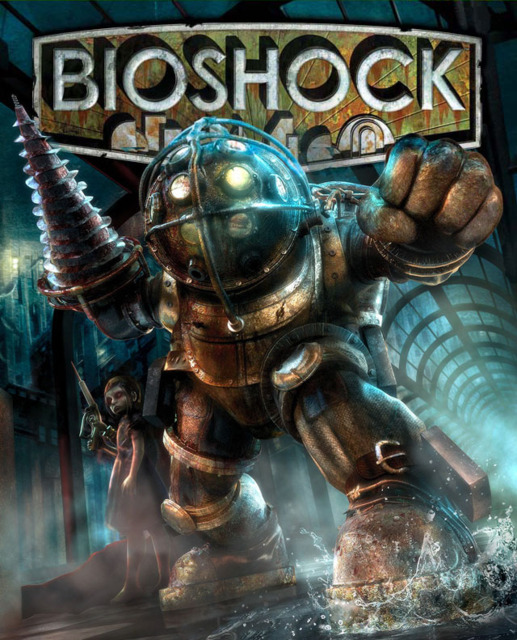

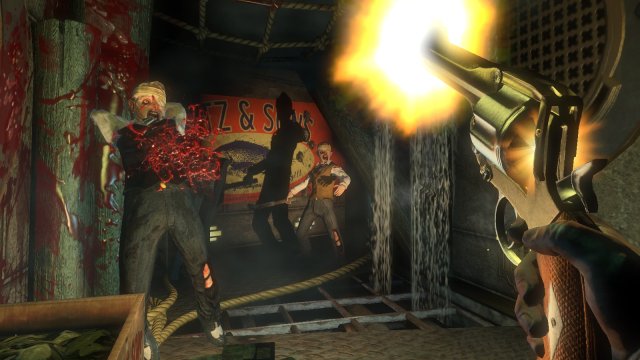
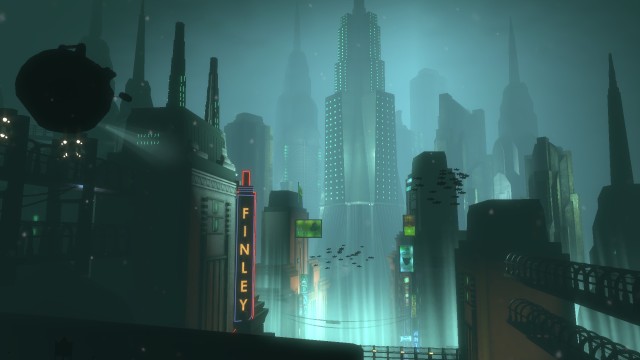


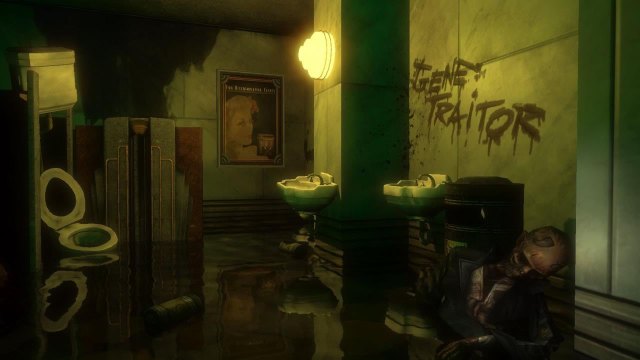
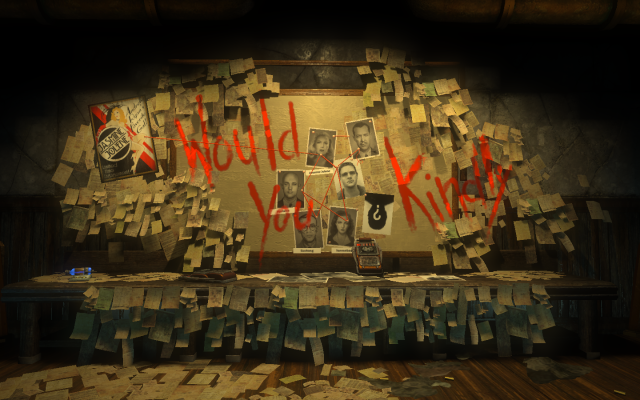
Log in to comment